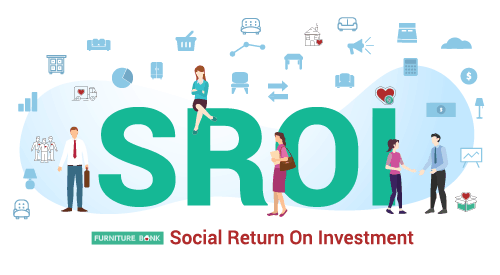Andrew Chung may be a digital marketing whiz by profession but he’s also no stranger to the non-profit sector.
Andrew has generously donated thousands of hours to helping various non-profit causes in and around the GTA over the past two decades. Not only is Andrew an active volunteer for the United Way of Greater Toronto, he is also the chair of Furniture Bank’s Board of Directors, a title he has held since early 2014. With six years of Furniture Bank support under his belt and a wealth of industry knowledge and insights, Andrew has been integral in helping Furniture Bank evolve our business model and reach more clients years after year.
Andrew spoke with volunteer Cam Gordon recently about his Furniture Bank journey and what he sees as the next steps in our evolution.
Now that you’re the chair of Furniture Bank’s Board of Directors and having moved through many volunteer roles with the organization, how have you seen your duties and approach evolve over your time with Furniture Bank?
Way back when I joined and introduced programming and a certain fundraising approach, I definitely saw myself as an agent of change rather than somebody who would lead that change. The leap to becoming the Board chair all happened quite organically. When our previous chair Gerry Purcell stepped down earlier this year, I was able to step into that role because I did have a lot of legacy knowledge about the organization and what we had done before. I brought more thinking around programming and fundraising structure to the organization.
What were some of your initial contributions to Furniture Bank when you first started volunteering in 2009?
When I first joined, the fundraising model of the board was just getting started in defining itself. I was just volunteering in a general capacity at first but eventually took the lead on the fundraising and marketing committee. Adopting a programming focus was a big step and in time, my role began to focus more on development and chairing that committee. That group oversees not just the marketing but also new business ventures and relationships.
Compared to some of the other volunteer work you’ve performed, how does the Furniture Bank experience differ?
The Furniture Bank board is a bit different because we’re pretty hands-on and focused on working, as opposed to just high-level, more strategic thinking and planning. Our board members tend to be more grassroots in terms of both the planning and “doing” of things within the organization.
Do you find this mentality extends elsewhere in the organization, both for volunteers and for staff?
Absolutely. Organizationally and culturally, Furniture Bank does have a real business mindset. During my time volunteering for United Way and elsewhere, I’ve probably dealt with over 100 non-profit organizations so I’ve seen firsthand how our overall approach is fairly unique in this space. How we run our call centre is a good example of this mentality. It’s not just about the logistics of arranging a pick-up. It’s now also involves educating callers on the other things we’re doing—it’s more of a dialogue. Culturally, we’re seeing this broader approach across the organization and it’s shown in the overall impact we’ve made in a few areas. The composition of our board reflects this as well. If you took a look at the board of another not-for-profit, you’d probably see some past clients, maybe somebody from the government space or a real range of backgrounds. With our board, there is a commonality in terms of attracting people who are really entrepreneurial. A lot of them are partners or business leads in a professional setting. We’re finding what we do and how we run is very much consistent with that kind of sensibility.
In terms of time spent, how have you found that your scheduling has changed since you became chair?
The time commitment has definitely ramped up since I became the chair. On an average week, I’m spending maybe 10-20 hours on various activities, depending on the focus at that time. I meet with the broader board on a monthly basis and then all the committees I’m involved with, I meet with them monthly as well.
During your 6+ years with Furniture Bank, have you seen a noticeable spike in awareness of our organization?
There does seem to be a greater level of awareness of what Furniture Bank is and what we do. There still will be moments when I’m in a business meeting and they’ll be some need to get into the background about the organization and the type of services we offer. I wouldn’t say we’re obiquitous quite yet across the GTA but in general, I do feel like awareness and understanding has increased from what I can tell.
What do you see as the “next steps” for Furniture Bank, both from a practical and aspirational level?
Going forward, we really have two real mandates. The first is to restore dignity and normality into people’s lives. We aid people who are in a transition period and give them support that they need. The second mandate, and we’re starting to do more of this, is taking somebody who has barriers to employment and giving them the skills and confidence they need to ultimately be placed in a work setting. It’s the old “Teach a man to fish…” analogy, which is very true and consistent with how we approach things. That combination of what we do and how we do it has really transformed the ways in which we’re perceived by funders. That’s been a huge positive change I’ve seen during my time.






